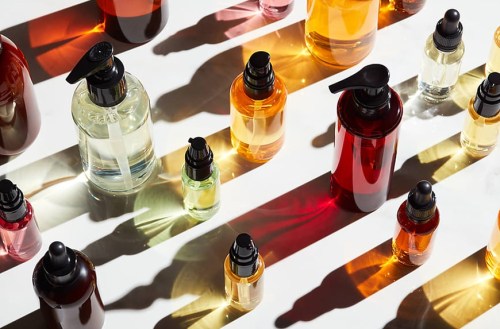Cannabinoids, terpenes, full-spectrum or isolate—unless you’re fluent in cannabis, you basically need a dictionary to navigate the lingo on the typical CBD product label. (Or, you know, a bookmark on your phone leading directly to Well+Good…)
Well, there’s yet another buzzword that you should be adding to your vocab list: nanotechnology. A scientific process that’s said to make cannabinoids more easily absorbed by the body, many marijuana-based brands are now claiming they’ve harnessed it in order to make their products work better.
Nanotech isn’t exclusive to the cannabis world—you can find tons of beauty products, medications, and supplements that tout its use—but it’s definitely become a major subject of fascination when it comes to CBD, a non-psychoactive cannabis compound that’s said to have serious healing properties.
Here’s how it works, in extremely simplified terms: Scientists are able to take certain substances, like CBD, and create nanoparticles of them that are so small, they can be absorbed into your bloodstream more efficiently than regular-sized particles of the same substance. “As the particles get smaller and smaller, the microparticles still behave very similarly to the macroparticles,” says Anubhav Pratap Singh, PhD, an assistant professor of food processing at the University of British Columbia. “But as we reduce the particles to a few hundred nanometers, some properties of the particles are completely different than the old particles…[for instance], they can pass through gaps that they were unable to [pass through] before. So we try to take advantage of this in different forms.”
The cannabis community’s intrigued by this technology for a few reasons, says Dr. Singh. “If you smoke cannabis, it gets vaporized so your lungs can absorb it—but [people] don’t want to smoke it anymore, because we all know smoking is very dangerous for health,” he points out. “Or you can ingest it, but the stomach and the liver destroy a lot of cannabis compounds. So the cannabis industry is looking to increase the bioavailability [of products] and, more importantly, make sure the effect is uniform for every person.”
“Moving into 2020, I think most of the cannabis products in the market will be produced in this way.”—Anubhav Pratap Singh, PhD
For instance, the University of British Columbia is currently working with Abatis Bioceuticals, a Canadian cannabis R&D company, to research the ways nanotechnology can improve the absorption of CBD when taken by mouth. CBD skin-care brands, too, are betting big on going small. Take Defynt, for example—a new arrival to the market, its $89 serum utilizes nanotechnology to help reduce inflammation in the skin. As creator Olivia Alexander explains it, nanoparticles of CBD oil can be mixed with water, while larger particles cannot. “Our process uses a proprietary, patent-pending form of nanotechnology to make the product water-compatible,” she says. “Our body is 95 percent water, so the absorption of a water-compatible molecule is always going to be higher than an oil infusion.”
This makes sense—think about how quickly your skin drinks up a serum, whereas facial oils tend to sit on top of the skin for a while. And according to cosmetic chemist Stephen Alain Ko, this could make CBD skin-care products that use nanotechnology more effective. “Generally, active ingredients need to access deeper layers of skin where the tissue is living to make physiological changes,” he says. “But nanoemulsions don’t necessarily increase skin penetration as a blanket statement; it depends on the specific ingredient and the type of nanotechnology. And whether or not this is proven [for CBD] is not yet clear.”
Dr. Singh confirms that cannabis nanotechnology hasn’t historically been widely studied, but he says much research is being done right now—and he’s confident that the results will be positive. “We’re starting to see some very good quality papers coming in already about cannabis and nanotechnology and its impact on health,” he says. “Moving into 2020, I think most of the cannabis products in the market will be produced in this way.”
But that doesn’t mean all products with the word “nanotechnology” on the label are legit. Ko warns that it’s important to do your homework and ensure you’re buying from reputable brands, as there are a lot of shady claims being made across the cannabis market as a whole. “One [CBD water] brand claims that it contains ‘4 million nanograms’ [of CBD] in its product, but when a consumer sent it into a lab for testing, it was the only product to return with no CBD detected,” he says. As the market matures, the less-than-noble players will surely be weeded out—but until then, keep your BS meter on high alert.
Still skeptical about CBD? Here are 8 products that might just convert you. Or you could make like Well+Good’s beauty editor and test out a CBD massage.
Sign Up for Our Daily Newsletter
Get all the latest in wellness, trends, food, fitness, beauty, and more delivered right to your inbox.
Got it, you've been added to our email list.










